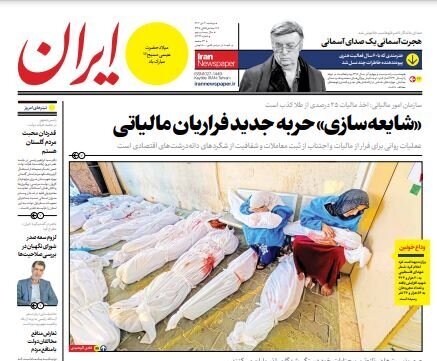Tehran's active diplomacy in the region

TEHRAN - In a note, the Iran newspaper addressed the international meeting regarding Palestine in Tehran and wrote: The Tehran meeting was held as a continuation of the active diplomacy that the Islamic Republic carried out with the aim of immediately stopping the war and helping the people trapped in the devastating war in Gaza.
It pursued diplomatic approaches to help the final settlement process of this historical dispute. A day before this meeting, the UN Security Council approved a resolution that only focused on the issue of providing aid to the people of Gaza, and this was while the efforts of the United States prevented the proposal of "stopping the war" in this resolution, something that the president pointed to in his speech at the Tehran meeting and called the United States an indisputable accomplice of crime and genocide in the occupied territories due to its opposition to the resolutions supporting "ceasefire". President Raisi also emphasized the need to pursue 3 urgent solutions to solve the current crisis in the region, i.e. "immediately stopping the attacks", "lifting the blockade of Gaza and opening the crossings for relief" and also "creating a special fund to help rebuild Gaza".
Siasat-e-Rooz: British leaders dance on the blood of Palestinians with anti-Iranian positions
In an analysis, Siasat-e-Rooz discussed the British Foreign Secretary's prate and said: David Cameron, who is struggling to rid the Zionist regime of defeat against Hamas and reduce the world's disgust with this regime, in his deceptive words, accused Iran of doing "malicious activities" in Britain and the West Asia region. He threatened that the UK should work with its allies to take a series of deterring measures against Tehran. This type of behavior from the British, on the one hand, derives from media propaganda to link the war between the Zionist regime and the West to a power called Iran, in order to diminish the humiliation of not being able to defeat a small group called Hamas. On the other hand, they want to think that the multilateral pressure convinces Iran to go along with their policies against other resistance groups in the region, but Tehran has always emphasized that it does not give orders to resistance groups. The only way to end this situation is the global confrontation with the crimes of the Zionist regime and the end of the blockade of Gaza.
Sobh-e-No: Political hostage-taking
In a commentary, Sobh-e-No discussed Sweden's anti-Iranian action. It wrote: It was last week that Hamid Nouri's appeal court was held in Sweden on false accusations and his sentence of life imprisonment was confirmed. But the principle of the matter is a political hostage-taking, through which the Swedish government is seeking the release of a spy who was responsible for the martyrdom of Iran's nuclear scientists. Of course, the rotating presidency of Sweden in the European Union is also a reason to hold such a show trial to tell Western and American statesmen that it is taking steps in line with their interests and the anti-Iranian view of the West. Sweden, with its radical right and left parties, is going to join NATO soon. Of course, such anti-Iranian actions of the Swedish government are a green light to the Zionist regime and the Western governments to somehow tell them that it is taking steps in line with their Iranophobic agenda and can secure their interests in this direction.
Ham Mihan: The link between Iran and Turkey
In an article, Ham Mihan discussed the closeness of Iran and Turkey's positions on the issue of the Gaza war and said: Hamas's attack on Israel on October 7 has shaken the fragile regional order in West Asia. In the midst of increasing attacks by militias affiliated with Iran, an additional 900 U.S. troops have been deployed to the U.S. Central Command's area of operations to bolster defense forces. America's action in the region has worried Turkey and Iran. Iranian authorities have called the United States an accomplice of Israel in the massacre of civilians in Gaza. Ankara and Tehran, beyond their rhetorical criticism, complain about the unwillingness of the United States to put pressure on Israel for a ceasefire and worry that a stronger U.S. presence in the region would be detrimental to their regional interests. The Gaza war may help bring Turkey and Iran closer together, according to their common opposition to the U.S.-led regional and global order. However, there are serious limitations to a lasting alliance between these two countries.
